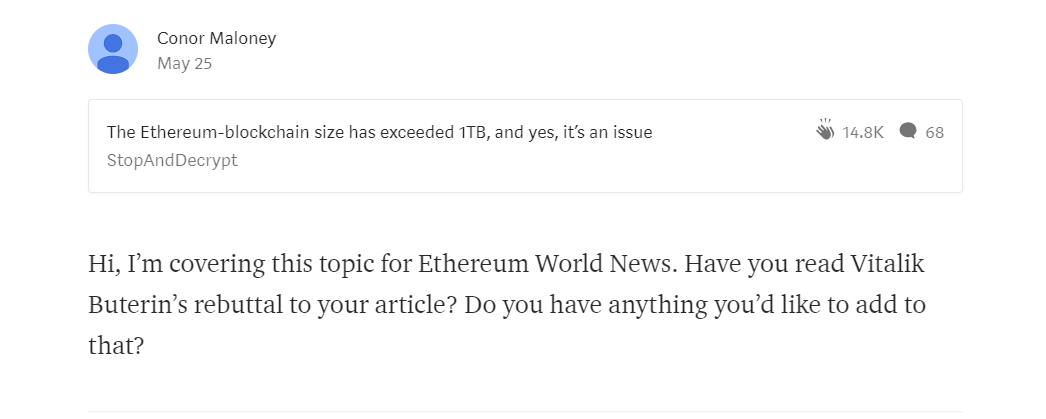On May 23 Hackernoon published an article entitled “The Ethereum-blockchain size has exceeded 1TB, and yes, it’s an issue.” The article was authored by StopAndDecrypt, who has written a handful of other articles for the website, mostly about Bitcoin and their views as a Bitcoin maximalist.
The article in question took aim at many features of the Ethereum blockchain which StopAndDecrypt felt were flawed, starting with block size. In a paragraph titled “My Argument: Larger blocks centralize validators” StopAndDecrypt said:
“The incentive structure of the base layer is completely broken because there is no cap on Ethereum’s blocksize, and even if one was put in place it would have to be reasonable, and then these Dapps wouldn’t even work because they’re barely working now with no cap.”
Following the theme of their writing history on the site, the Hackernoon contributor brought it all back to Bitcoin, saying the bottleneck for the Bitcoin network was blocksize, and that “Because of Ethereum’s exponentially growing blocksize, the bottleneck is not regulated below these external factors and as such results in a shrinking and more centralized network.”
The writer predicted that both Ethereum and Bitcoin Cash (referred to throughout the BTC maximalist’s article as “BCash”, a term designed to insult Bitcoin Cash supporters), remarking that “Ethereum is dying and Bcash is trying to be just like it.”
1: Ethereum’s blocksize growth is bad because of node processing requirements, not how much they need to store on a hard-drive
2: To prevent complete collapse of the network, Ethereum will need to implement a reasonable blocksize cap.
3: Implementing a blocksize cap will raise fees and in return prevent many Dapps from functioning, or severely slow down. Future Dapps won’t work.
4: If Dapps don’t work, Ethereum’s entire proposition for existing is moot.
Not quite done, the anonymous Bitcoin writer took a swing at sharding as well, stating that sharding just involved rebranding full nodes that users would never be able to run before posting a Kevin Pham tweet about not crossing Bitcoiners in an attempt to respond to Vitalik Buterin’s corrections.
Buterin responds
Compared to the long-winded Hackernoon article running the gamut from Bitcoin, Bitcoin Cash, the Lightning Network, and how it was unwise to be an “enemy of Bitcoin”, Buterin’s article was short and to the point in dismantling StopAndDecrypt’s argument.
Buterin called the underground writer’s points on bottlenecking and node synching “severely uninformed” before pointing out exactly what was so wrong with both of StopAndDecrypt’s statements.
This is *severely* uninformed. Ethereum already has a block size limit in the form of its gas limit, and this gas limit is at 8 million and has been there for the last six months. Fast sync datadir growth has flatlined at 10GB per month for the last six months and it’s not going to go much higher, if only because increasing the gaslimit much further would lead to uncle rate centralization issues.
Buterin went on to explain that StopAndDecrypt’s understanding of nodes in the Ethereum network was actually “highly fallacious” and stated that far from “all the nodes desynching” as suggested on Hackernoon, users can resynch as rarely as once a year to lower datadir size, or simply run a parity node which prunes the blockchain as it goes.
StopAndDecrypt claimed “Now with sharding it can downgrade to a “shard node”. None of this matters. You’re still losing a full-node every time one downgrades.”
Buterin responded saying:”
The whole point of sharding is that the network can theoretically survive with ZERO of what you call “full nodes”. And if there are five full nodes, those five full nodes don’t have any extra special power to decide consensus; they just verify more stuff and so will find their way to the correct chain more quickly, that’s all. Consensus-forming nodes need only be shard nodes.”
Finally, Buterin highlighted an error repeated throughout the article, finishing off his article (and perhaps his opponent) with the words:
“Finally, you’re using the term “BCash” wrong; it’s an implementation, not a blockchain/cryptocurrency.
So please learn about the tech before you criticize next time.”
Ethereum World News reached out to StopAndDecrypt regarding Buterin’s response: StopAndDecrypt did not respond to comment requests.
Edit:
On July 06, StopAndDecrypt announced on Reddit that he had never been contacted by Ethereum World News and then tweeted about the issue.
This is false, and EWN displayed proof that he was contacted hours after his article was published, asking if he would like to respond to Vitalik Buterin’s rebuttal about his apparent failure to comprehend the mechanics of the Ethereum network.

StopAndDecrypt, who is a moderator on r/bitcoin, claims to have missed the message on his article, although replied to the commenter directly above shortly before the EWN comment request was made. On July 06 he was asked a second time to respond to Buterin’s rebuttal and once again chose not to supply EWN with a comment to refute Buterin’s criticism.

